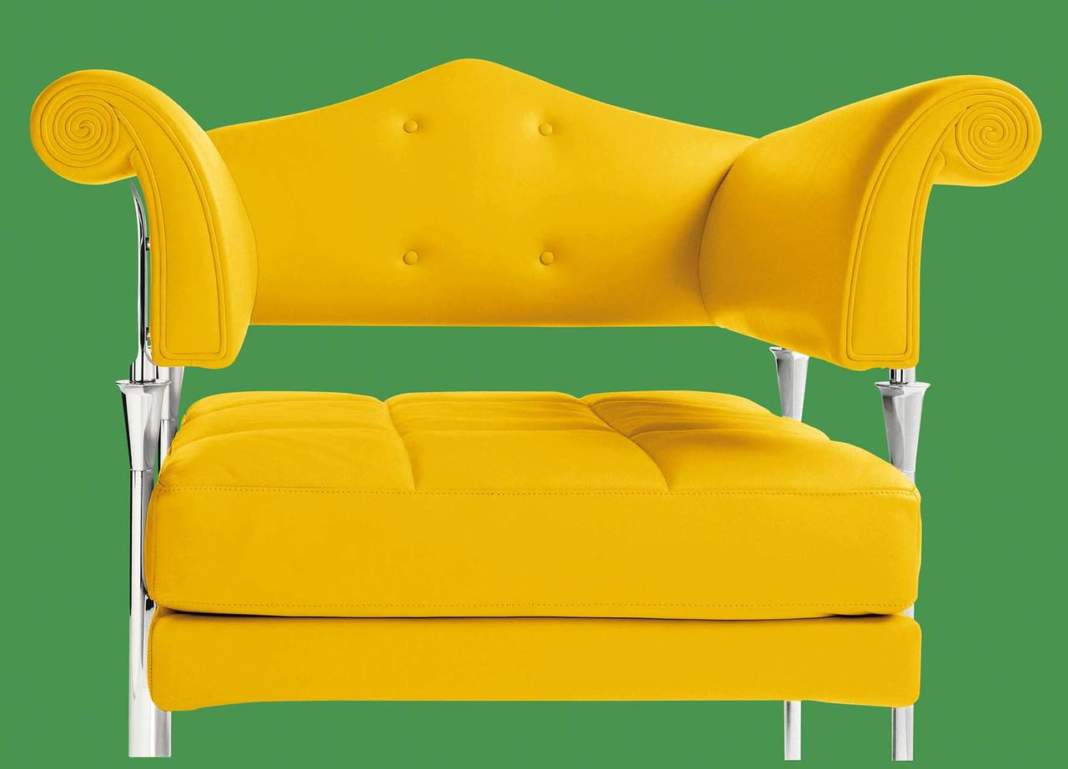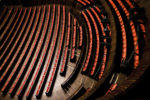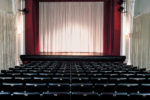M.C.: Contracts are often confused with supplies. However, a true contract is based on the presupposition that a company possesses the know-how and ability necessary to manage every aspect of a contract, something few are actually able to do. Poltrona Frau is one of the few Italian companies which operate in the contract sector. But what is the meaning of this term?
A.G.: Contract is not just the supply of a product, it is first and foremost a service offered a client, public or private, which demands a turnkey package, the realization of every aspect related to a project, by a certain deadline. Our company has made this important transition, along with the other ones belonging to the contract division of the Poltrona Frau Group; we currently work together to cover all brackets of the market and to satisfy the desires and requirements of the community in realizing large-scale projects.
M.C.: When did you begin to work in the contract sector? Did the company, in a certain moment, decide that it was necessary to evolve its product into service?
A.G.: Poltrona Frau commenced this adventure due to a wager between its president Franco Moschini and Gian Carlo Menotti, at that time president of the Festival of Two Worlds, concerning the supply for a theatre interior. The company had never thought of dedicating itself to this kind of work until then. When the challenge was won, it was in 1982, a desire to continue this experience was born. Poltrona Frau have fine-tuned this work, thanks to the experience with ocean liners, the Rex in 30’s, because it already had, at the time, the necessary sources to get involved in a contract ante-litteram. This first experience, the know-how acquired thanks to the first supply of the theatre/auditorium, has over the years been followed by many other projects (hotels, offices, restaurants, airports).
M.C.: What are the most important sectors, as far as Poltrona Frau is concerned?
A.G.: Poltrona Frau has a very clear and strong image in the seating market. The term seating is used to indicate the chair, conceived and created specifically – ad hoc – for every public venue, we work in particular in the sector of theatres, auditoriums, concert hall, airports but also showrooms. We have made various products for leading car manufacturers as for instance BMW, for whom we have made a chair, the result of a collaboration between their technical department and those of Poltrona Frau, which is exhibited in all the showrooms in the world.
M.C.: When you have to supply chairs for a theatre, does the contract require you to also take care of the floors, lighting and other aspects, or is your contract focused, in the sense that you only dedicate yourself to your specific sector?
A.G.: This depends more on the customer than on us, we are ready to realize every part of the interior, we have done so in theatres where we have taken care of everything from the parquet floor to the stage curtain, other interior textiles, wall coverings and everything else that was necessary in terms of interior decoration. It is clear that most requests concern chairs, because our expertise and know-how in this sector cover all its countless aspects. We have a catalogue of about 25 chairs for theatres and auditoriums, and we create as many every year.
M.C.: What is the relationship between contract and production for the market, in terms of company turnover?
A.G.: We really produce very little for the retail market, because everything we do is, in every case, ad hoc creations, also in the seating sector. We often happen to provide turnkey supplies, especially for auditoriums or theatres, because the customers know that we have the knowledge, the expertise and experience necessary to operate in this sector.
M.C.: You are consequently required to have a technical department capable of not only managing the chair, but also other aspects…
A.G.: We have a technical department which is well supplied, which is able to focus on the company’s core business, but also to venture beyond.
M.C.: What kind of effect do the special projects have on production for the retail market? Some companies have told us: “none, the contract division makes its products, while the standard production for retail has its designers, there is no interference”. The situation is different in Poltrona Frau, I believe a credible case consists of the one where the armchair designed by Renzo Piano may become part of the standard catalogue. I believe that to you, who work specifically in the seating sector, this kind of transition of knowledge is more feasible.
A.G.: In fact, this transition of experience is much easier to us: sometimes it is a matter of a specific requirement, other times of requests for very famous models from our catalogue, which are the result of contract projects. In these cases it is a matter of pieces designed for the furnishing of hotels, where we have made quite important “turnkey” projects, with furniture items designed by famous architects. For instance, I may mention an armchair which is before the eyes of everyone every night: the famous Hidra by Luca Scacchetti, which appears on television, as part of the sets used by anchorman Bruno Vespa. That armchair was created for a hotel in Perugia, where we have realized a turnkey project designed by architect Scacchetti. It was conceived for a very specific setting and, presented by the contract division, it has ended up in the catalogue of Poltrona Frau.
M.C.: I believe the contract sector may have a future, not just because it produces turnover, but also because it makes it possible for companies to experiment. Just like races become an opportunities for the car industry to test innovative technological solutions, in the field of industrial design it is specific contracts which provide these opportunities for research and development. This is where experiments are done, and then this experience is reflected in the standard production. In my opinion, this is also a way to do research at acceptable costs, because it is no longer possible today, as it was in the Seventies, to have a designer design a specific product, and then launch it in the market. Working on a contract, on the contrary, is a way to absorb the investment and construction expenses, which at the same time makes it possible to keep alive a tradition of extraordinary items, of one-off pieces, which would not otherwise be possible.
A.G.: All this is plain routine for us, but that’s not all: to work on a contract is also a way to accelerate the process. If it takes from one year to eighteen months to produce a model which is to become part of the standard catalogue – considering the approval, the corporate process and that of design – it is much quicker to realize a site specific product, which takes three or four, at most six months. And in those months we manage to concentrate the entire product process. This has been the case, for instance, with the auditorium chairs designed by Frank Gehry, Renzo Piano,…which, created for a specific context, have then become part of the catalogue. All this makes the collaboration between designer and company extremely symbiotic, as the manufacturing process is commenced immediately, something which leaves more room for research and experimentation.
M.C.: How has the way you work in the Contract division of Poltrona Frau changed after the creation of the group comprising Cassina, Cappellini, Alias, Gebruder Thonet Vienna, Nemo, Gufram and Poltrona Frau? Is there a synergy between the technical departments of the different companies? What is the salient trait?
A.G.: I believe the creation of the group has contributed to improve the awareness, on the part of each company, of the distinctive expertise and know-how each may offer. The different experiences the individual companies have acquired allow the group to operate in many different sectors and market brackets. All this makes the contract division particularly capable of solving the problems of different clients, and to offer them not just products, but also services and experience in the different sectors.
M.C.: What are the most important projects you have recently completed with famous architects, in which you have not only supplied the chair, but managed entirely the contract?
A.G.: An excellent turnkey management, including the launch of a very special chair, has been the PalaRiccione, where we have taken care of every part of the interiors of the congress centre, from the floors to the ceilings, including the walls and a very special chair, which folds into the floor. Thanks to a computerized system this new patent allows to move the seat that in few minutes becomes part of the floor. It is designed by Anselmi/Passarelli/Gandolfi.
M.C.: Since the theme of the chair is a very specific one, which even the great architects know little about, how do you work with them? Is it your professionals who engineer the product?
A.G.: We do anything which is necessary to develop the initial design idea of the architects. We exchange ideas with them, try to understand their requirements and offer all our cooperation and experience to realize the project. We start from the sketch, engineer it and then we make drawings, prototypes and proceed with the realization in a very short time.
Alberto Gullini direttore responsabile della divisione contract di Poltrona Frau un‘azienda che, per scommessa del presidente Franco Masini, iniziò a fare contract nel 1982, ma già negli anni ‘30 aveva curato gli arredi del transatlantico Rex. www.poltronafrau.it Alberto Gullini director of the contract division of Poltrona Frau, a company that, for a bet of the president Franco Masini, began the contract experience in 1982, but in the ‘30s had designed the furniture of the transatlantic Rex.









